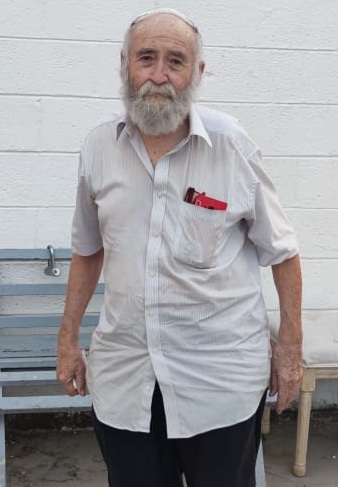Shmuel Prestnov
Shmuel (Samuel) Prestnov, is a Russian-born scientist and a member of our community in Ashkelon. He’s a scion of Russian rabbinic families, born on February 2, 1936. His grandfather was the rabbi of Kharkiv, Ukraine, until 1926, when he was exiled, and then killed, by the KGB.
His father was a chemical engineer and was drafted to an elite unit at the beginning of the war, fighting against chemical warfare. “When the war with the Germans began in 1941, I was only five years old,” recalls Shmuel. “My father was taken by the Red Army. My mother and my grandmother took us, two small children, on the last train, in the goods carriage, and we left war-torn Kharkiv.
“We arrived at the Azov Sea but had no more money to continue our escape. By Divine intervention, we met my mother’s relatives who gave us some money and we continued on our way to Fergana, Uzbekistan. At first, all we had to eat was water and some rice so that we wouldn’t die of starvation. Later, my mother found work in a village picking cotton and so we had a piece of bread and chicken soup from the village. The soup was very bitter and difficult to eat, so I would break my bread up into small pieces and put it in the soup to sweeten it.
“There was a Russian, antisemitic boy in the village who threatened to kill me with his toy gun. Though it was a toy, I was still very afraid, and it left a strong impression on me for the rest of my life. After half a year, we moved to Tashkent, the capital of Uzbekistan. My mother sent me to kindergarten. Finally, once a week in kindergarten, they would give us a small cube of meat and I would suck it and eat it with such pleasure, string by string.
“Once, I accidentally took my two-year-old brother to a fast-flowing river and we almost drowned. My mother punished me harshly, and then she cried with me. When I began going to school they would give us bourekas in the morning. I didn’t eat them; I saved them for my brother.
“I remember May 9, the day of victory over the Nazis. It was a big celebration for everyone, they were all happy and embracing each other, after the enormous suffering during the war. I recall how when my father returned from the war, my mother bought him a bottle of cream and didn’t allow anyone else to touch it. My grandmother once sold her gold jewelry to a non-Jewish neighbor in exchange for just two loaves of bread.
“In 1946 we returned to our hometown, Kharkiv. Our building was destroyed, but we managed to find room on the basement floor, one room for the entire family. When I finished school, I prepared to be accepted to university. My father said that since we want to immigrate to Israel, it would be worth entering a field connected with developing the cities and tractors. I went to study in Odessa.
“Close to the end of my studies, I married my first wife, Golda, and we had two daughters—and eventually 10 grandchildren! I emigrated to Israel in 1990 during the large aliya wave from the USSR. My cousins who came in the 1970s helped me connect with an Israeli scientist, Alex Keren. I organized groups of scientists from the USSR, and we succeeded in getting government funding for our developments. Afterward, I worked in a greenhouse in Ashkelon. Recently, I’ve been working for a development company. Thank G-d, I’ve registered 30 patents in Israel. My last patent is a more modern solar battery. I thank G-d for bringing me to Israel and giving me the opportunity to learn Torah at Colel Chabad for seniors in Ashkelon with my teacher, Rabbi Gedalia.”

Leave a Reply